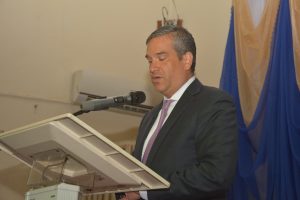NECA seeks Constitutional Reforms
Funmi Ogundare
Nigeria Employers Consultative Association (NECA) has called on the government to make the country more productive.
The Association also stressed the need for political will and constitutional reforms that would eliminate states and local governments’ dependence on the monthly revenue allocation in Abuja.
It further stressed the need for state governments to think outside the box in order to be economically viable and sustainable in the long- term, eliminate the high cost of governance and frivolous expenditure under the guise of security votes.

Speaking at the 62nd Annual General Meeting (AGM) of the association, the second Vice President of NECA, Mr. Mauricio Alarcon, expressed concern that the Presidential Business Environment Council (PEBEC), established to remove bureaucratic constraints to doing business in the country, seems not to be achieving its mandate.
According to him, “In business-friendly climes, regulators are meant to facilitate business growth with consequential positive effects on employment generation, security, poverty alleviation and higher GDP growth rate.
“However, the experience in Nigeria happens to be different. Regulators have turned themselves to income-generating entities, not necessarily always for government’s coffers, with a penchant for sanctions without recourse to due process.
“Perhaps, some government agencies derive pleasure when business shutdown or is it that the successes of the chief executives depend on how many businesses are sanctioned or closed down?” This trend, he noted would only increase the rate of unemployment, escalating insecurity, reduce the inflow of foreign direct investment and further push the country into the abyss of underdevelopment.
Alarcon, however, called on the government to call to order, regulatory agencies that he said had constituted themselves as clogs in the wheel of the ease of doing business, saying such agencies should not be measured by how much income they generate or how many organizations they are able to sanction, but how many businesses they facilitated and helped to succeed.
While commending the various initiatives and social intervention programmes of government aimed at poverty alleviation, the vice president regretted that these by the poverty index was insufficient.
“As much as social interventions have their place in poverty alleviation, we charge government to deepen its intervention by creating an enabling environment for large, medium and small enterprises to thrive as the long term solution to poverty include job creation, improved standard and quality of education, health and general wellbeing of our people, increased access to finance and policies that encourage investment. These remedies, in addition to current efforts, would significantly lift Nigerians above poverty level,” Alarcon stressed.
The Vice President, Professor Yemi Osinbajo, who was represented by a former Special Adviser to the President on Economic Matter, Dr. Yemi Dipeolu, said the private sector has a big role to play in ensuring the growth and development of the economy, adding that the federal government was committed to improving major sectors through creation of jobs, improving infrastructures, among others.
Other stakeholders at the programme said there was the need to engage government on a policy that would continue to sustain economic growth and development, adding that with the increasing role of the private sector. Nigeria should be seen as a business partner by other countries rather than a development partner.
The AGM witnessed the induction of 66 organisations into the association and certificate of membership were given to them.



Recent Comments